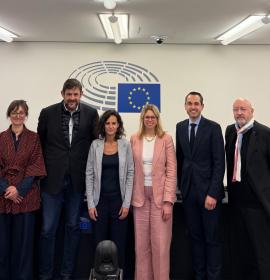Europe’s textile and apparel industry calling for decisive action
November 26, the European Parliament took a welcomed and necessary step by voting a resolution calling for stronger market surveillance, reinforced customs controls and faster enforcement of the Digital Services Act in case of infringements. For Europe’s textile and clothing manufacturers, this is the first political acknowledgement that the system is broken — and that enforcement must finally match the scale of the problem.
This breakthrough follows months of intense mobilisation by EURATEX and its members: the Declaration against ultra fast-fashion in Paris during Première Vision, the joint industry call for a fair and safe e-commerce environment, and various high-level meetings with Commission officials (joined by consumers, trade unions and retailers). Awareness has risen sharply — in the media, in national capitals, in Brussels.
But even as momentum builds, we are witnessing developments that risk undoing everything. National postal operators in countries such as Poland, France and Italy are now entering into partnerships with platforms like Temu, pledging to accelerate the delivery of precisely those parcels that escape EU rules and undermine compliant European businesses and put consumers at risk by undermining well established rules to protect exactly those customers from harm.
These moves do not just contradict the political direction set by the Parliament — they actively widen the loopholes that Europe is trying to close. EURATEX warns that Europe is reaching a point of no return. In the first half of 2025, textile production fell by 1.9%, clothing production by 5%. Employment is shrinking — down 4–5% in textiles, 3% in clothing — while imports are surging: +7.7% for textiles, +12.3% for clothing. European exports, meanwhile, are in decline. This competitive imbalance is not a trend; it is a structural threat.
If Member States and EU institutions do not act now — decisively and coherently — Europe’s own standards will become meaningless, and a vital industrial ecosystem will fade. The solution is straightforward and overdue: we expect to end the de minimis exemption, the application of customs, VAT and safety rules to all, the enforcement of the DSA with speed to stop giving foreign ultra-fast fashion players a free pass. The forthcoming ECOFIN meeting of 12 December should be an important milestone in this process.
This was also EURATEX’ message at yesterday’s event in the European Parliament, hosted by MEPs Pierre Jouvet and François Kalfon: the absence of a level playing field, exploding imports from ultra-fast fashion platforms, unsafe and non-compliant products circulating freely, and the loopholes — especially the de minimis exemption — that allow millions of parcels to enter the EU every day without any meaningful customs or VAT controls.
EURATEX’ President Mario Jorge Machado stated: “We welcome the European Parliament’s vote, but the real test starts today. Member states and the EU need to accelerate the adoption of necessary tools and legislation, to restore a level playing field and maintain a competitive European textile industry.”
Euratex




